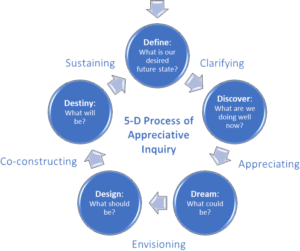An Appreciative Approach to Disability Inclusion in Adult Learning

by Dr. Lisa B. Webb
What are the life-giving stories of your organization as it relates to learners with differing abilities (i.e., English language learners or learners with disabilities)? What do you experience as the core values of your organization and how do those values inform your approach to these learners? What three wishes would you make to heighten the vitality and health of this organization as it relates to the experiences of learners with differing abilities? These questions represent an Appreciative Inquiry approach to achieving deep organizational transformation.
Appreciative Inquiry (AI) is an evidence-based, generative, and strengths-based approach to organizational development and change. When applied in the context of adult learning, it can be a powerful tool for creating inclusive and empowering learning environments. Issues of access to learning for individuals with differing abilities often relies on a deficit-based approach that prioritizes adherence to legal requirements to ensure access for individuals in protected statuses. AI can significantly transform adult education by focusing on strengths, positive experiences, and collaborative problem-solving through a generative process. The AI framework is closely aligned with the principles of Universal Design for Learning (UDL), which aims to reduce barriers in the learning environment through flexible and inclusive instructional practices.
AI is also a culturally responsive process that highlights the importance of collaboration and shared decision-making. This emphasis on inclusive participation ensures that individuals from different cultural backgrounds are actively involved in shaping the inquiry process. AI involves asking positive and open-ended questions that encourage storytelling and reflection. These thoughtful questions elicit narratives that incorporate cultural values, traditions, and unique experiences, enriching the understanding of the cultural context. For these reasons, AI is a meaningful way for organizations to reconsider and reevaluate current practices with regard to inclusive learning for learners with differing abilities.
The 5-D process of Define, Discover, Dream, Design, and Destiny offers a roadmap for organizations who seek to improve outcomes for learners with differing abilities. The first step in the AI process is to define the focus of your inquiry, identifying the opportunities for growth and flourishing in your organization. At the beginning of your work together, your organization will spend time identifying the focal point of your inquiry through questioning. What do you know about the current experiences of learners with differing abilities? What is the desired future state of your organization as it relates to this population? Once you’ve identified the focus of your inquiry, you can move on to the important work of discovery.
The main goal of the discovery phase in AI is to understand the best of what exists within the organization. AI values inclusive participation and emphasizes involving all stakeholders in the inquiry process—educators, adult learners, administrators, support staff, and community members. Inclusive participation ensures that diverse perspectives are considered, leading to more comprehensive and relevant insights. In the discovery part of AI, the organization conducts interviews with stakeholders, asking open-ended questions such as the ones posed at the beginning of this article, to better understand what is working well in the learning environment, what strengths exist, and what positive experiences participants have had. Teams then begin to identify themes that emerge from the interviews and these themes become the foundation for the next phase in the AI process. It may be important to revisit the initial inquiry and refine your focus even further after you’ve engaged in the discovery process.
In the dream phase, teams begin to envision an ideal learning environment. All stakeholders in the organization are invited to share their aspirations and ideas for an inclusive learning environment that maximizes the strengths identified during the discovery phase. Based on identified strengths and aspirations, specific strategies and actions are developed collectively that will move the organization forward. AI emphasizes collaboration and co-creation. In the context of adult education, this could involve collaborative curriculum design, joint problem-solving grounded in past successes related to equitable access, and shared decision-making at the policy level. The remainder of the 5-D process involves deeper planning and implementation (Design) and celebration of accomplishments (Destiny).

The resources, tools, and ideas offered within this article can inform your practice and transform the learning experience for learners with differing abilities. The AI framework keeps the focus on an ideal future state for your organization as you begin to consider your own practices and imagine possibilities for a more inclusive and transformative learning experience. Beginning with generative questions that focus on the positive core of your organization will allow you to make the best use of the tools and resources offered. The Center for Appreciative Inquiry provides a wealth of resources to guide your efforts if you are interested in this approach. Bushe’s 2007 study (as cited in Armstrong et al., 2020), defines AI as “the quest for new ideas, images, theories and models that liberate our collective aspirations, alter the social construction of reality and, in the process, make available decisions and actions that weren’t available or didn’t occur to us before (p. 30).” Through the intentional application of AI, adult learners are empowered to be co-creators in building a better future. I invite you to discover the best of your organization or your own practice, and to dream about the possibilities as together we strive to “liberate our collective aspirations.”
References
Armstrong, A. J., Holmes, C. M., & Henning, D. (2020). A changing world, again. How Appreciative Inquiry can guide our growth. Social Sciences & Humanities, 2(1). https://doi.org/10.1016/j.ssaho.2020.100038
CAST. (2024). About Universal Design for Learning. Retrieved February 23, 2024, from https://www.google.com/url?q=https://www.centerforappreciativeinquiry.net/resources/the-generic-processes-of-appreciative-inquiry-5ds/&sa=D&source=docs&ust=1708973150389523&usg=AOvVaw1JgLwFLLOFAJywHEeCRxhG
Cooperrider, D. (2012). What is Appreciative Inquiry? Retrieved February 23, 2024, from https://www.davidcooperrider.com/ai-process/#
The Center for Appreciative Inquiry. (2024). Generic process of Appreciative Inquiry. Retrieved February 23, 2024, from https://centerforappreciativeinquiry.net/resources/the-generic-processes-of-appreciative-inquiry-5ds/
 Lisa Webb has more than 15 years of professional experience in the development, implementation, and evaluation of student programs and academic support services in high school and graduate health sciences education. In her current role at Virginia Commonwealth University (VCU), she manages workforce development initiatives as part of VCU’s anchor institution mission, and ensures that current health sciences students have access to academic and disability support services. She is also responsible for the implementation of health career pipeline program initiatives to encourage underrepresented students to pursue careers in healthcare. Dr. Webb is a certified rehabilitation counselor (CRC), with a Master of Science in rehabilitation counseling and a doctoral degree in educational leadership, both from VCU, and holds a graduate faculty affiliate position with the VCU School of Education. Her areas of research interest include implicit bias in the recruitment process and in the classroom, adult learning, impact evaluations of health career pipeline programs, and implementation evaluations of new initiatives in postsecondary education.
Lisa Webb has more than 15 years of professional experience in the development, implementation, and evaluation of student programs and academic support services in high school and graduate health sciences education. In her current role at Virginia Commonwealth University (VCU), she manages workforce development initiatives as part of VCU’s anchor institution mission, and ensures that current health sciences students have access to academic and disability support services. She is also responsible for the implementation of health career pipeline program initiatives to encourage underrepresented students to pursue careers in healthcare. Dr. Webb is a certified rehabilitation counselor (CRC), with a Master of Science in rehabilitation counseling and a doctoral degree in educational leadership, both from VCU, and holds a graduate faculty affiliate position with the VCU School of Education. Her areas of research interest include implicit bias in the recruitment process and in the classroom, adult learning, impact evaluations of health career pipeline programs, and implementation evaluations of new initiatives in postsecondary education.